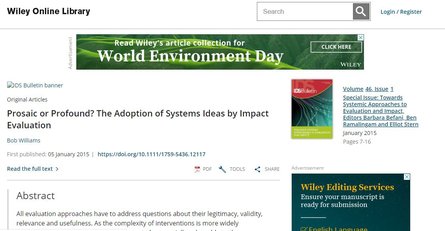
All evaluation approaches have to address questions about their legitimacy, validity, relevance and usefulness. As the complexity of interventions is more widely acknowledged, impact evaluation appears to be especially vulnerable to these challenges. This article explores the potential of the systems field to address these vulnerabilities. The systems field is conceptualised as understanding interrelationships, engaging with multiple perspectives and reflecting on where boundaries are drawn in terms of those interrelationships and perspectives. This article argues that achieving a balance between these three elements is critical. An emphasis on interrelationships is likely to bring only limited (prosaic) benefits to impact evaluation as a whole. On the other hand, a strong emphasis on perspectives and boundaries could result in profound changes to the way in which impact evaluation is conceived and delivered. In particular, it could change the nature of the relationship between the evaluator and key stakeholders, especially funders and managers of interventions.